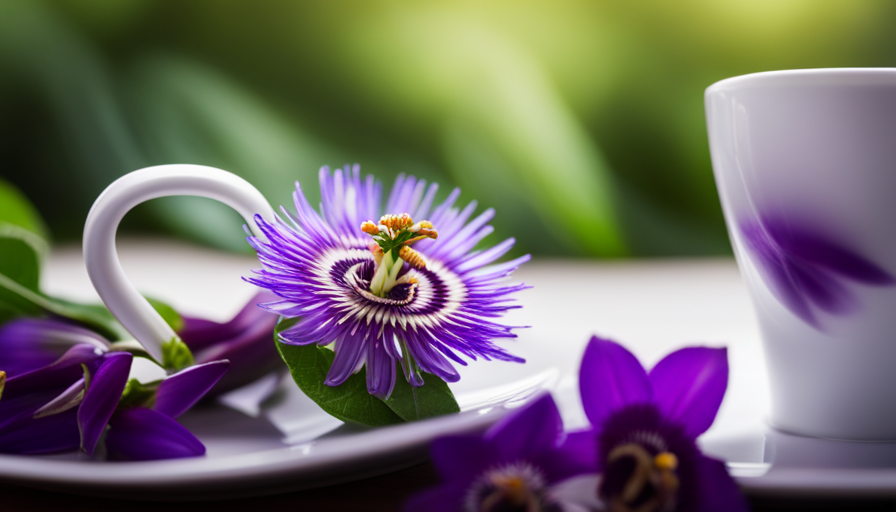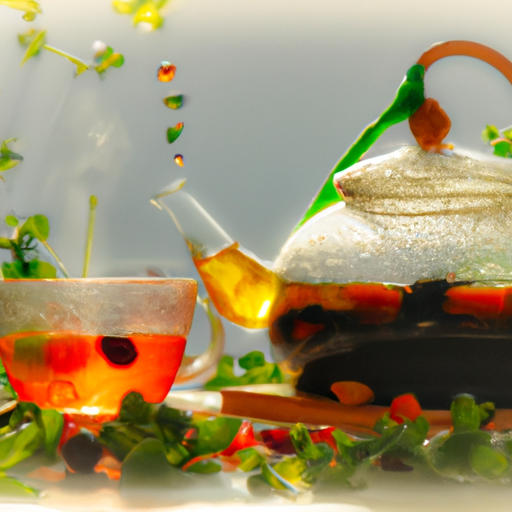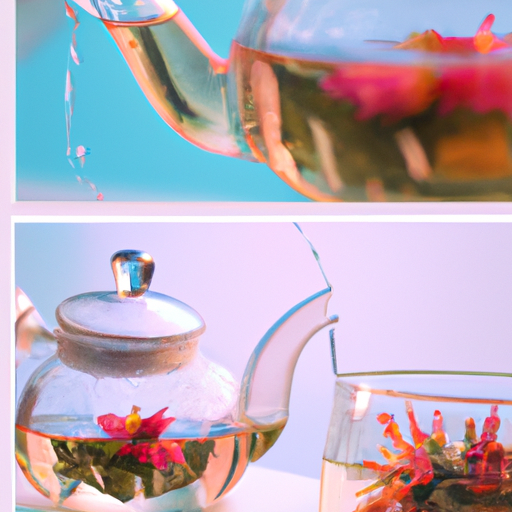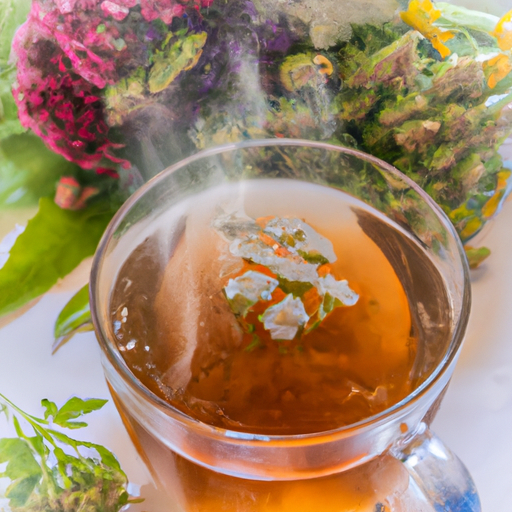Passion flower tea, made from the passionflower plant, has become increasingly popular for its potential health benefits. As a dedicated tea lover, I have conducted thorough research to reveal the facts about this herbal remedy.
It is believed that passion flower tea possesses calming properties, making it a potential aid for anxiety and insomnia management. Additionally, it may offer stress reduction and even pain relief benefits.
This holistic tea has also been praised for its potential digestive aid and blood pressure regulation properties. However, it is important to approach passion flower tea with caution, as there are potential side effects and precautions to consider.
In this article, we will explore the evidence-based benefits of passion flower tea and its potential role in promoting overall well-being. So, let’s dive in and discover what this fascinating tea can do for us.
Key Takeaways
- Passion flower tea has potential health benefits, including calming properties, aid in anxiety and insomnia management, stress reduction, and pain relief.
- It contains flavonoids and alkaloids that have sedative effects on the central nervous system, promoting relaxation and improving sleep quality.
- Passion flower tea provides antioxidant benefits, protecting the body against free radicals and supporting overall well-being.
- It can also support digestive health, regulate blood pressure, and boost the immune system. However, caution should be exercised, and consultation with a healthcare professional is advised.
Overview of Passion Flower Tea
Passion flower tea is a delicious and soothing beverage that offers a variety of benefits for both the mind and body. This herbal tea has a long history and cultural significance, as it’s been used by indigenous tribes in the Americas for centuries. The passion flower, known scientifically as Passiflora incarnata, is native to the southeastern United States. It’s been traditionally used to promote relaxation and relieve anxiety.
There are different ways to prepare passion flower tea. One method is to steep the dried leaves and flowers in hot water for about 10 minutes. This allows the beneficial compounds in the plant to be released into the tea. Another way to prepare passion flower tea is by combining it with other herbs, such as chamomile or lemon balm, to enhance its flavor and calming properties.
Passion flower tea is known for its calming properties, which can help reduce stress and anxiety. The tea contains flavonoids and alkaloids that have been shown to have sedative effects on the central nervous system. These compounds can promote relaxation and improve sleep quality. Additionally, passion flower tea has been found to have anti-inflammatory and antioxidant properties, which can support overall health and well-being.
Transitioning to the subsequent section about the calming properties, passion flower tea is a natural and holistic option for those seeking relaxation and stress relief.
Calming Properties
With its calming properties, sipping on passion flower tea feels like a gentle embrace, lulling the senses into a state of tranquility. Passion flower tea has been used for centuries as a natural remedy for stress management and relaxation techniques. This herbal infusion contains compounds like flavonoids and alkaloids, which have been found to promote relaxation and reduce anxiety.
One of the key components in passion flower tea is a flavonoid called chrysin, which has been shown to have anxiolytic effects. It works by increasing the levels of gamma-aminobutyric acid (GABA) in the brain, a neurotransmitter that helps regulate anxiety and promote relaxation. By enhancing GABA activity, passion flower tea can help calm the mind and reduce feelings of stress and tension.
In addition to its anxiolytic properties, passion flower tea also acts as a mild sedative, promoting a restful sleep and aiding in relaxation. This can be particularly beneficial for individuals who struggle with insomnia or have difficulty winding down at the end of the day.
Overall, passion flower tea is a natural and holistic approach to stress management and relaxation. By incorporating this herbal infusion into your daily routine, you can experience the soothing effects it has on the mind and body. Transitioning to the next section on anxiety management, passion flower tea can be a valuable tool in promoting overall well-being.
Anxiety Management
Are you looking for effective ways to manage your anxiety? Passion flower tea is a natural remedy that can help you find relief. This holistic approach has been used for centuries to promote relaxation and reduce anxiety symptoms.
Here are five reasons why passion flower tea is beneficial for anxiety management:
-
Calming effects: Passion flower tea contains compounds that can help calm your mind and body, promoting a sense of relaxation.
-
Stress reduction: Drinking passion flower tea can help reduce stress levels, which can contribute to anxiety.
-
Sleep improvement: Passion flower tea can help improve the quality of your sleep, which is essential for managing anxiety.
-
Muscle relaxation: This herbal tea has muscle relaxant properties that can help ease tension and promote relaxation.
-
Mood enhancement: Passion flower tea can help improve your mood and reduce feelings of anxiety and depression.
By incorporating passion flower tea into your daily routine, you can experience the natural benefits it offers for anxiety management.
In the next section, we’ll explore how passion flower tea can also provide relief for insomnia.
Insomnia Relief
If you’re tired of counting sheep, sip on a cup of passion flower tea and say goodbye to sleepless nights. Passion flower tea has been used for centuries as a natural remedy for sleep disorders.
This beautiful flowering plant contains compounds that promote relaxation and help calm the mind, making it easier to fall asleep and stay asleep throughout the night.
Passion flower tea is believed to work by increasing levels of a neurotransmitter called gamma-aminobutyric acid (GABA) in the brain. GABA helps to regulate the excitability of neurons and has a calming effect on the central nervous system. By increasing GABA levels, passion flower tea can help reduce anxiety and promote a sense of calm, making it easier to drift off into a peaceful slumber.
Research has shown that passion flower tea can be effective in improving sleep quality and reducing the time it takes to fall asleep. It has also been found to have fewer side effects compared to traditional sleep medications.
Additionally, passion flower tea is considered a holistic approach to insomnia relief, as it not only addresses the symptoms but also supports overall well-being.
If you’re looking for a natural remedy to help with sleep disorders, passion flower tea may be a good option for you. Its calming effects and ability to promote relaxation can help you achieve a restful night’s sleep. Transitioning into the next section about stress reduction, it’s important to note that managing stress is also crucial for a good night’s sleep.
Stress Reduction
Feeling overwhelmed and stressed? Take a moment to discover effective strategies for reducing stress and regaining a sense of calm. When it comes to stress management, incorporating relaxation techniques into your daily routine can be incredibly beneficial.
One such technique is drinking passion flower tea. This herbal tea has been used for centuries to promote relaxation and alleviate anxiety. Passion flower contains compounds that have been shown to have a calming effect on the nervous system, helping to reduce feelings of stress and tension.
Drinking passion flower tea can help to induce a state of relaxation, making it a great option for those looking to unwind after a long day. Whether you prefer to enjoy a cup of tea in the evening before bed or during a midday break, the soothing properties of passion flower can help to ease your mind and promote a sense of tranquility.
In addition to its stress-reducing benefits, passion flower tea also provides antioxidant benefits. These antioxidants help to protect the body against free radicals, which can cause damage to cells and contribute to aging and disease. So, if you’re looking for a natural way to manage stress and support your overall well-being, consider incorporating passion flower tea into your daily routine.
Transitioning into the next section, let’s explore the antioxidant benefits of this remarkable herbal tea.
Antioxidant Benefits
Indulge in the rejuvenating elixir of passion flower tea, a key to unlocking the fountain of youth within you. Beyond its stress-reducing properties, passion flower tea offers a myriad of antioxidant effects that can support your immune system.
Antioxidants are powerful compounds that help protect our cells from damage caused by free radicals, which are unstable molecules that can lead to chronic diseases and aging. Passion flower tea contains various antioxidants, such as vitexin, isovitexin, and quercetin, which have been shown to scavenge free radicals and reduce oxidative stress in the body.
By incorporating passion flower tea into your daily routine, you can boost your immune system and enhance your overall well-being. These antioxidants not only protect your cells from damage but also have anti-inflammatory properties that can support a healthy immune response. A strong immune system is essential for fighting off infections and illnesses, keeping you feeling vibrant and energized.
Moreover, the antioxidant effects of passion flower tea have been linked to potential pain relief. As we age, it’s common to experience aches and discomfort in our joints and muscles. The antioxidants in passion flower tea may help reduce inflammation, easing pain and promoting a greater sense of comfort in your daily life.
Unlock the potential of passion flower tea and embrace its antioxidant benefits for immune support and potential pain relief.
Potential for Pain Relief
Experience the soothing power of passion flower tea as it potentially eases pain and brings you a greater sense of comfort in your daily life. Passion flower tea has been used for centuries as a natural alternative for pain management. Here are three ways passion flower tea may help relieve pain:
-
Muscle Relaxation: Passion flower tea contains compounds that have muscle relaxant properties, which may help alleviate muscle tension and reduce pain associated with muscle spasms or cramps.
-
Anxiety Reduction: Chronic pain often leads to anxiety and stress, which can worsen the perception of pain. Passion flower tea has calming effects on the nervous system, helping to reduce anxiety and promote relaxation, potentially providing relief from pain.
-
Sedative Effects: Passion flower tea has mild sedative properties, which may aid in promoting better sleep. Quality sleep is crucial for pain management as it allows the body to heal and recover. By improving sleep quality, passion flower tea may indirectly alleviate pain.
Incorporating passion flower tea into your daily routine may offer a natural alternative for pain relief. Moving forward, let’s explore how passion flower tea can also be a digestive aid.
Digestive Aid
As you sip on this enchanting brew, let the gentle waves of relief wash over your troubled stomach, like a calm river soothing the jagged edges of a wounded landscape. Passion flower tea has long been used as a natural remedy to support digestive health. Its soothing properties help calm an upset stomach, ease indigestion, and promote overall digestive wellbeing.
Passion flower tea contains compounds that’ve been shown to reduce inflammation in the digestive tract, which can help alleviate symptoms such as bloating, gas, and stomach cramps. It also acts as a mild sedative, helping to relax the muscles of the digestive system and promote healthy digestion.
In addition to these benefits, passion flower tea’s believed to have a positive impact on overall gut health. It can help balance the gut microbiome, which’s crucial for proper digestion and nutrient absorption. By supporting a healthy gut environment, passion flower tea can contribute to improved digestive function and overall wellness.
Transitioning into the next section, passion flower tea’s benefits extend beyond just digestive health. Its natural compounds also’ve the potential to regulate blood pressure and promote cardiovascular wellbeing.
Blood Pressure Regulation
Immerse yourself in the calming embrace of passion flower tea, and feel the gentle ebb and flow of your blood pressure as it finds its natural rhythm, like a serene river flowing through your veins. Passion flower tea has been used for centuries as a natural remedy for blood pressure control, offering a holistic approach to maintaining cardiovascular health. Here are three reasons why passion flower tea can be beneficial:
-
Relaxation: Passion flower tea contains compounds that’ve been shown to promote relaxation and reduce anxiety. By calming the mind and body, it can help lower blood pressure levels.
-
Antioxidant Effects: The antioxidants found in passion flower tea can help protect blood vessels from damage caused by oxidative stress. This can contribute to improved blood flow and more stable blood pressure.
-
Vasodilation: Certain compounds in passion flower tea’ve been found to promote the dilation of blood vessels, allowing for better circulation and potentially aiding in the regulation of blood pressure.
As with any natural remedy, it’s important to exercise caution and be aware of potential precautions and side effects.
Transitioning into the next section, it’s crucial to understand the potential risks associated with passion flower tea.
Precautions and Side Effects
Before indulging in passion flower tea, it’s important to be aware that approximately 10% of individuals may experience mild dizziness as a potential side effect. This is a common reaction and usually subsides on its own after a short period of time. However, if the dizziness persists or worsens, it’s recommended to discontinue use and consult with a healthcare professional.
In addition to potential dizziness, passion flower tea may also interact with certain medications. It’s important to speak with a doctor or pharmacist if you’re taking any prescription medications, particularly those that affect the central nervous system or have sedative effects. Passion flower tea has been known to enhance the effects of these medications, which can lead to excessive drowsiness or dizziness.
Furthermore, allergic reactions to passion flower tea are rare but possible. If you have a known allergy to plants in the Passiflora family, such as passion fruit or passionflower, it’s best to avoid consuming passion flower tea. Allergic reactions can range from mild symptoms, such as itching or hives, to more severe reactions, such as difficulty breathing or swelling of the face, lips, or tongue. If you experience any signs of an allergic reaction, seek immediate medical attention.
While passion flower tea can offer many benefits, it’s important to be aware of potential side effects and interactions with medications. If you have any concerns or questions, it’s always best to consult with a healthcare professional before incorporating passion flower tea into your routine.
Frequently Asked Questions
Can passion flower tea be consumed by pregnant women?
Passion flower tea can be consumed by pregnant women, but it’s important to consult with a healthcare provider first. The benefits of passion flower tea include its calming effects, which can help relieve anxiety and promote better sleep. However, potential side effects such as drowsiness and dizziness may occur. It’s always best to err on the side of caution during pregnancy and seek professional advice before adding any new herbal teas to your routine.
Is passion flower tea safe for children?
Passion flower tea is generally safe for children when consumed in moderation. However, it’s important to take safety precautions. Children under the age of six should avoid passion flower tea due to potential side effects. For older children, it’s best to consult with a healthcare professional before giving them passion flower tea. There are alternative calming remedies available, such as chamomile tea or lavender aromatherapy, which may be more suitable for children.
How long does it take for passion flower tea to start showing its calming effects?
Passion flower tea has a calming effect, and the time it takes to experience these effects can vary. Generally, it starts working within 30 minutes to an hour after consumption.
To make passion flower tea, steep 1-2 teaspoons of dried passion flower in hot water for 10-15 minutes. The recommended dosage is 1-2 cups per day. However, it’s important to consult with a healthcare professional, especially when giving it to children, to ensure safety and appropriate dosage.
Can passion flower tea help with symptoms of depression?
Passion flower tea has potential benefits for symptoms of depression. It’s important to note that while some studies suggest its effectiveness, more research is needed. To prepare passion flower tea, steep 1-2 teaspoons of dried passion flower in hot water for 10-15 minutes. However, it’s crucial to consult a healthcare professional before using it, as it may interact with certain medications. Additionally, possible side effects may include dizziness, drowsiness, and upset stomach.
Does passion flower tea interact with any medications?
Interactions between passion flower tea and medications can occur. It’s essential to consult a healthcare professional before combining them. For instance, passion flower tea may increase the sedative effects of certain medications, leading to excessive drowsiness.
Additionally, it may interact with blood thinners, causing an increased risk of bleeding. Being aware of potential interactions and side effects is crucial for maintaining your health and preventing any adverse reactions.
Conclusion
In conclusion, passion flower tea is a natural remedy that offers a wide range of benefits. It’s calming properties make it an effective tool for managing anxiety and reducing stress. Additionally, it can provide relief from insomnia and potentially help with pain management.
One interesting statistic to note is that a study conducted on individuals with high blood pressure found that passion flower tea significantly reduced their systolic and diastolic blood pressure levels. This highlights the potential of passion flower tea as a holistic approach to maintaining overall well-being.










